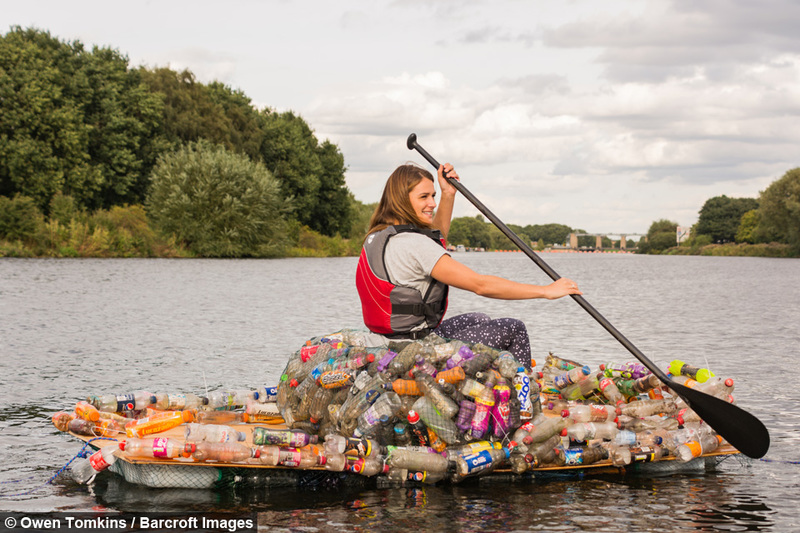
What inspired Lizzie Carr to build a raft out of rubbish?
If we used a time machine to fast forward ourselves 500 years into the future, what would the archeologists of the future be finding out about us? Well, one thing they'd discover is that we used an awful lot of plastic. In fact, the average Briton gets through at least 200 plastic bottles every year. There are over 64 milllion people in the UK, so that's around 13 billion bottles per year! And that's just the UK. Imagine how many bottles get used across the world every year!
Plastic is a real problem, not just in the shape of bottles, but plastic bags, plastic furniture, plastic TVs, plastic cameras, plastic buckets.... the list goes on and on. Look around your home and you'll find you have plastic all over the place! The trouble is that when plastic is no longer useful to us, we tend to throw it away. It's possible to recycle many plastics (there are loads of different kinds) but they can't be mixed up, so recycling has to be done with great care. But plastic that isn't recycled just doesn't disappear.
Plastic doesn't biodegrade (rot away naturally). Over long periods of time, it does photodegrade (breaks down when exposed to light), but this is a process that can take hundreds of years, and even then, it only breaks down into smaller pieces. It doesn't really disappear. It's incredible to think that pretty much every piece of plastic that has ever been made is still on our planet's surface, lurking above- or underground, or in our lakes, rivers, waterways and oceans. And the plastic that's already buried underground will still be there for those archaeologists of the future to discover!
Environmentalist Lizzie Carr (30) was inspired to highlight the problem of the rubbish that is building up in our canals and waterways after taking up the sport of paddle boarding two years ago. During her time on the water, she was constantly encountering rubbish that people had thrown in the water and decided she needed to do something to make a difference.
Earlier this year, she paddleboarded 400 miles across England's canals and rivers and plotted every single piece of plastic she encountered along her route on a map (http://lizzieoutside.co.uk/blog/the-canals-are-choking)
Then she revisited the four 'hot spots' for rubbish that she had discovered on her journey: Tamworth, Coventry, Stoke on Trent and Manchester, collecting as much plastic rubbish as she could in three days. Her next challenge was to use this rubbish - mostly plastic bottles - to create a raft she could paddleboard on.

Lizzie said: “Plastic bottles were everywhere, you couldn’t get away from them. There were lots of plastic bags, dummies, a lot of kids' toys, things like frisbees, traffic cones, trolleys, a couple of scooters, quite a lot of clothes and shoes, even plant pots with the plants still in them. Genuinely kitchen sinks - you’d find that sort of thing in there."
With help from some friends, Lizzie built a raft using 900 plastic bottles from the 14 sacks of trash she had collected! You can see a video of her building the raft here:
She said "Seeing the pollution and rubbish on the waterways is sad: it's not a nice experience for anyone paddling on it or for the wildlife that have to live with it. This challenge is my way of giving back."
You can help by always recycling plastic if you can. If you have plastic that can't be recycled, make sure it goes in a bin and is disposed of properly. Never just drop it on the ground, or in the water.
